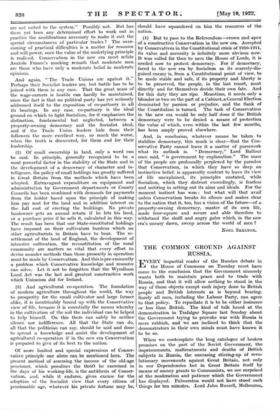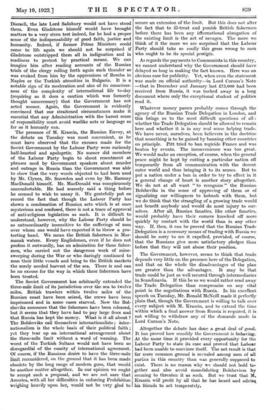THE COMMON GROUND AGAINST RUSSIA.
"LIVERY impartial reader of the Russian debate in 1'4 the House of Commons on Tuesday must have come to the conclusion that the Government sincerely wants both to maintain peace and to trade with Russia, and that it will allow nothing to stand in the way of those objects except such injury done to British people and British interests as is beyond bearing. Surely all men, including the Labour Party, can agree to that policy. To repudiate it is to be either insincere or less than British. The kind of talk heard at the demonstration in Trafalgar Square last Sunday about the Government trying to provoke war with Russia is, mere rubbish, and we are inclined to think that the demonstrators in their own minds must have known it to be so.
When we contemplate the long catalogue of broken promises on the part of the Soviet Government, the imprisonments, maltreatments and deaths of British subjects in Russia, the =ceasing stirring-up of revo- lutionary movements against Great Britain, not only in our Dependencies but in Great Britain itself by means of money grants to Communists, we are surprised at the moderation and patience which the Government has displayed. Palmerston would not have stood such things for ten minutes. Lord John Russell, Melbourne, Disraeli, the late Lord Salisbury would not have stood them. Even Gladstone himself would have brought matters to a very stern test indeed, for he had a proper sense of the indispensability of good faith, justice and humanity. Indeed, if former Prime Ministers could come to life again we should not be surprised if -Gladstone outstripped them all in indignation and in readiness to protest by practical means. We can imagine him after reading accounts of the Russian trials of the clergy rolling forth again such thunder' as was evoked from him by the oppressions of Bomba in Naples or the Turkish atrocities in Bulgaria. It is a notable sign of its moderation and also of its conscious- ness of the complexity of international life to-day (requiring as it does a caution which was formerly thought unnecessary) that the Government has not acted sooner. Again, the Government is evidently convinced that our straitened circumstances make it essential that any Administration with the barest sense of responsibility must avoid warlike acts or language so far as it humanly can.
The presence of M. Krassin, the Russian Envoy, at the debate on Tuesday was most convenient, as he must have observed that the excuses made for the Soviet' Government by the Labour Party were curiously half-hearted and apologetic. No sooner did members of the Labour Party begin to shout resentment at phrases used by Government speakers about murder and outrage in Russia than the Government was able to show that the very words objected to had been used by -Mr. Clynes, Mr. Snowden and even by Mr. Ramsay MacDonald himself. Mr. MacDonald was conspicuously uncomfortable. He had scarcely said a thing before he seemed to wish to unsay it. We gratefully put on record the fact that though the Labour Party has shown a condonation of Russian acts which is at once mysterious and confused, there is not a trace of approval of anti-religious legislation as such. It 'is difficult to understand, however, why the Labour Party should be so extraordinarily insensitive •to the sufferings of men over whom one would have expected it to throw a pro- tecting hand. We mean the British fishermen in Mur- mansk waters. Every Englishman, even if he does not profess it outwardly, has an admiration for these fisher- men, who carried out the dangerous work of mine- sweeping during the War or who daringly continued to man their little vessels and bring to the British markets the sorely needed harvest of the sea. There is and ean be no excuse for the way in which these fishermen have been treated.
The Soviet Government has arbitrarily extended the three-mile limit of its jurisdiction over -the •sea to twelve miles. British trawlers within twelve miles of the Russian coast have been seized, the crews have been imprisoned and in some cases starved. Now the Bol- sheviks announce that the fishermen have been released, but it seems that they have had to pay large fines and that Russia has kept the money. What is it all about ? The Bolsheviks call themselves internationalists ; inter- nationalism is the whole basis of their political faith ; yet they tear up as international .arrangement about the three-mile limit without a word of warning. The worst of the Turkish Sultans would not have been so disregardful of the -comity of international agreement. Of course, if the Russians desire to have the three--mile limit reconsidered, on the ground that it has been made obsolete by the long range of modern guns, that would be another matter altogether. In our opinion we ought to accept such a proposal, and we are not sure that America, with all her difficulties in enforcing Prohibition weighing heavily upon her, would not be very glad to secure an extension of the limit. But this does not alter the fact that to ill-treat and punish British fishermen before there has been any international abrogation of the existing limit is the act of savages. The more we think of it the more we are surprised that the Labour Party should take so coolly this gross wrong to men who ought to be its special proi4ges.
As regards the payments to Communists in this country, we cannot understand why the Government should have delayed so long in making the fact known. Here was an obvious case for publicity. Yet, when even the statement was made on official authority—in Lord Curzon's Note that in December and January last £75,000 had been received from Russia, it was tucked away in a long document where only the exceptional student of politics read it.
Whatever money passes probably comes through the agency of the Russian Trade Delegation in London, and this brings us to the most difficult questions of a11: whether the Trade Delegation should be allowed to remain here and whether it is in any real sense helping trade. We have never, ourselves, been believers in the doctrine that something is to be gained by banning other countries on principle. Pitt tried to ban regicide France and was beaten by events. The inconvenience was too great. We would make an exception, of course, when the general peace might be kept by cutting a particular nation off temporarily from all communication with the decent outer world and thus bringing it to its senses. But to put a nation under a ban in order to try to effect in it a general change of heart is another story altogether. We do not at all want " to recognize " the Russian Bolsheviks in the sense of approving of them or of signalizing our willingness to hobnob with them, but we do think that the strangling of a growing trade would not benefit anybody and would do most injury to our- selves. After all, Russian fanatics, like other fanatics, would probably have their corners knocked off more quickly by contact with the world than in any other way. If, then, it can be proved that the Russian Trade Delegation is a necessary means of trading with Russia we should be sorry to see it expelled, provided, of course, that the Russians give more satisfactory pledges than before that they will not abuse their position.
The Government, however, seems to think that trade depends very little on the presence here of the Delegation, and that on the whole the disadvantages of the plan are greater than the advantages. It may be that trade could be just as well secured through intermediaries in Scandinavia. If this be so we would rather send away the Trade Delegation than compromise on any vital point in the negotiations with. Russia. In his excellent speech on Tuesday, Mr. Ronald McNeil made it perfectly plain that, though the Government is willing to talk over every subject with M. Krassin, and to extend the time within which a final answer from Russia is required, it is not willing to withdraw any of the demands made iu Lord Curzon's Note.
Altogether the debate has done a great deal of good. It has proved how sensibly the Government is behaving. At the same time it provided every opportunity for the Labour Party to state its case and proved that Labiaar had been unable to convince itself. The net result is that far more common ground is revealed among men of all parties in this country than was generally supposed to exist. There is no reason why we should not hold to• gether and also avoid consolidating Bolshevism by seeming to threaten it as such. But we trust that M. Krassin will profit by all that he has heard and advise, his friends to act temperately.











































 Previous page
Previous page